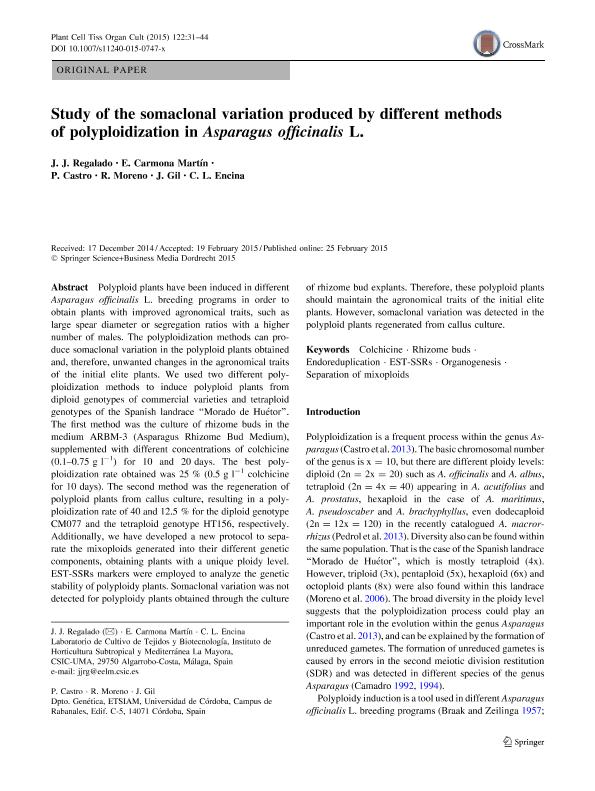Mostrar el registro sencillo del ítem
dc.contributor.author
Regalado González, Jose Javier

dc.contributor.author
Carmona Martín, E.
dc.contributor.author
Castro, P.
dc.contributor.author
Moreno, R.
dc.contributor.author
Gil, J.
dc.contributor.author
Encina, C. L.
dc.date.available
2018-04-20T17:56:48Z
dc.date.issued
2015-06
dc.identifier.citation
Regalado González, Jose Javier; Carmona Martín, E.; Castro, P.; Moreno, R.; Gil, J.; et al.; Study of the somaclonal variation produced by different methods of polyploidization in Asparagus officinalis L.; Springer; Plant Cell, Tissue and Organ Culture; 122; 1; 6-2015; 31-44
dc.identifier.issn
0167-6857
dc.identifier.uri
http://hdl.handle.net/11336/42869
dc.description.abstract
Polyploid plants have been induced in different Asparagus officinalis L. breeding programs in order to obtain plants with improved agronomical traits, such as large spear diameter or segregation ratios with a higher number of males. The polyploidization methods can produce somaclonal variation in the polyploid plants obtained and, therefore, unwanted changes in the agronomical traits of the initial elite plants. We used two different polyploidization methods to induce polyploid plants from diploid genotypes of commercial varieties and tetraploid genotypes of the Spanish landrace “Morado de Huétor”. The first method was the culture of rhizome buds in the medium ARBM-3 (Asparagus Rhizome Bud Medium), supplemented with different concentrations of colchicine (0.1–0.75 g l−1) for 10 and 20 days. The best polyploidization rate obtained was 25 % (0.5 g l−1 colchicine for 10 days). The second method was the regeneration of polyploid plants from callus culture, resulting in a polyploidization rate of 40 and 12.5 % for the diploid genotype CM077 and the tetraploid genotype HT156, respectively. Additionally, we have developed a new protocol to separate the mixoploids generated into their different genetic components, obtaining plants with a unique ploidy level. EST-SSRs markers were employed to analyze the genetic stability of polyploidy plants. Somaclonal variation was not detected for polyploidy plants obtained through the culture of rhizome bud explants. Therefore, these polyploid plants should maintain the agronomical traits of the initial elite plants. However, somaclonal variation was detected in the polyploid plants regenerated from callus culture.
dc.format
application/pdf
dc.language.iso
eng
dc.publisher
Springer

dc.rights
info:eu-repo/semantics/openAccess
dc.rights.uri
https://creativecommons.org/licenses/by-nc-sa/2.5/ar/
dc.subject
Colchicine
dc.subject
Rhizome Buds
dc.subject
Endoreduplication
dc.subject
Est-Ssrs
dc.subject
Organogenesis
dc.subject
Separation of Mixoploids
dc.subject.classification
Otras Biotecnología Agropecuaria

dc.subject.classification
Biotecnología Agropecuaria

dc.subject.classification
CIENCIAS AGRÍCOLAS

dc.subject.classification
Otras Ciencias Biológicas

dc.subject.classification
Ciencias Biológicas

dc.subject.classification
CIENCIAS NATURALES Y EXACTAS

dc.title
Study of the somaclonal variation produced by different methods of polyploidization in Asparagus officinalis L.
dc.type
info:eu-repo/semantics/article
dc.type
info:ar-repo/semantics/artículo
dc.type
info:eu-repo/semantics/publishedVersion
dc.date.updated
2018-04-16T14:56:44Z
dc.identifier.eissn
1573-5044
dc.journal.volume
122
dc.journal.number
1
dc.journal.pagination
31-44
dc.journal.pais
Países Bajos

dc.journal.ciudad
Dordrecht
dc.description.fil
Fil: Regalado González, Jose Javier. Instituto de Horticultura Subtropical y Mediterránea La Mayora; España. Consejo Nacional de Investigaciones Científicas y Técnicas; Argentina
dc.description.fil
Fil: Carmona Martín, E.. Instituto de Horticultura Subtropical y Mediterránea La Mayora; España
dc.description.fil
Fil: Castro, P.. Universidad de Córdoba; España
dc.description.fil
Fil: Moreno, R.. Universidad de Córdoba; España
dc.description.fil
Fil: Gil, J.. Universidad de Córdoba; España
dc.description.fil
Fil: Encina, C. L.. Instituto de Horticultura Subtropical y Mediterránea La Mayora; España
dc.journal.title
Plant Cell, Tissue and Organ Culture

dc.relation.alternativeid
info:eu-repo/semantics/altIdentifier/url/http://link.springer.com/article/10.1007%2Fs11240-015-0747-x
dc.relation.alternativeid
info:eu-repo/semantics/altIdentifier/doi/https://dx.doi.org/10.1007/s11240-015-0747-x
Archivos asociados
